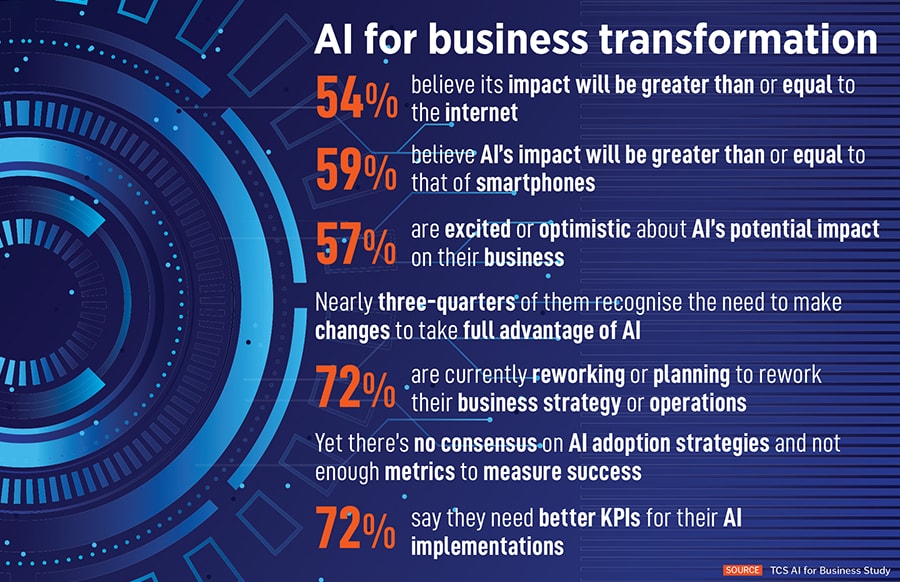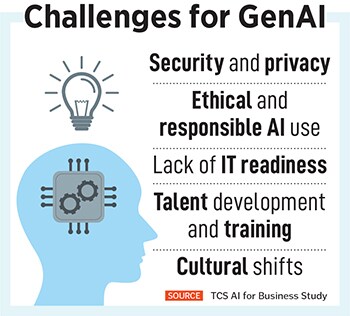Why 1,000 top executives voted for global AI standards
As AI systems begin to replicate complex human decisions, self-regulation by businesses won't be enough, most respondents said in a study by Tata Consultancy Services


Business leaders are less certain about how artificial intelligence (AI) will transform their operations for the better than the overall hype suggests, a new study by Tata Consultancy Services reveals.
Only 4 percent of the respondents in the survey said they’ve used AI in a way that had transformed their businesses, and nearly one in four said they hadn’t even moved beyond the initial exploratory phase, according to TCS’s AI for Business study. The company, India’s top IT services provider, released a report on its findings last week.
“Artificial intelligence has the potential to help companies reimagine entire value chains, experience pervasive performance improvements, and create new ways of working," CEO K Krithivasan writes in the report. “At the same time, the findings from our AI study, as well as our own experience working with large organisations, show that most companies are also thinking of how to balance risk with opportunity as they move forward with their AI strategy."

An important finding is that “an overwhelming 81 percent of the leaders polled have asked for a more ‘global’ set of regulations and standards on AI", Krithivasan adds.
Today, AI assists humans. As it matures, we will increasingly see it augment human activities and, eventually, transform businesses. AI will elevate human thinking with the ability to ideate based on machine output, he says.
 The survey was conducted earlier this year by TCS’s Thought Leadership Institute, polling 1,272 senior executives with profit-and-loss responsibilities in 12 industry sectors across Asia, Europe, the Nordics, Latin America, the US and Britain.
The survey was conducted earlier this year by TCS’s Thought Leadership Institute, polling 1,272 senior executives with profit-and-loss responsibilities in 12 industry sectors across Asia, Europe, the Nordics, Latin America, the US and Britain.
About half of the respondents were from companies that had annual revenue between $1 billion and $5 billion and the other half belonged to enterprises with more than $5 billion in revenue.
The top barriers to business success include current corporate IT infrastructure and customer expectations, TCS found in the double-blind study.
Organisations also recognise the need to move beyond existing metrics to measure the success of AI implementations. Nearly three out of four respondents (72 percent) said they didn’t have the right metrics. Another 8 percent were not even aware of any useful KPIs (key performance indicators) they could apply to AI-enabled operations, according to the study.

It’s not clear if the increased demand for AI applications among their customers also lead to a corresponding increase in hiring among the IT companies.
Among the respondents in the study—and it’s fair to assume many of them are customers of TCS—the question of what will happen to jobs drew opposing responses along a roughly even split. About 49 percent believe AI will either have no impact or increase job roles and 47 percent said AI will lead to more roles being eliminated than are created.

Unlike cloud computing, which is a broad, horizontal opportunity for everyone, the benefits of generative AI are currently limited to very specific deployments in individual segments or parts of a large company’s operations, Joshi at Everest says.
Therefore, “it’s very difficult to aggregate" the gains at an organisation’s level and turn that knowledge into a contract. However, that is the direction in which the IT companies are striving to go, which, in turn, will influence the number of people they hire to deliver the same type of work in an AI-led environment versus earlier, he says.
First Published: May 21, 2024, 13:18
Subscribe Now